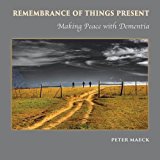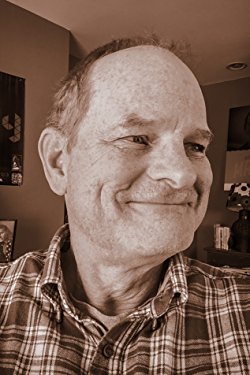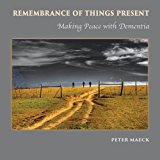 As the adult child of a parent who was diagnosed with Alzheimer’s, I was eager to read Remembrance of Things Present: Making Peace with Dementia by author Peter Maeck. I was pleased to find a book of photographs, poetry, and prose that explored the experiences of Maeck and his father as they traveled the road of dementia. In the beginning of the book Maeck admits to going through the Kubler-Ross “Five Stages of Grief”. From denial to depression and eventual acceptance, Maeck illustrates the book with photographs and poetry.
As the adult child of a parent who was diagnosed with Alzheimer’s, I was eager to read Remembrance of Things Present: Making Peace with Dementia by author Peter Maeck. I was pleased to find a book of photographs, poetry, and prose that explored the experiences of Maeck and his father as they traveled the road of dementia. In the beginning of the book Maeck admits to going through the Kubler-Ross “Five Stages of Grief”. From denial to depression and eventual acceptance, Maeck illustrates the book with photographs and poetry.
As the author recounts moments of memory he shared with his father, the reader is drawn into the experience; sharing the joy of a song remembered, a poem recited, a tune played on a harmonica. Using photographs to illustrate his poem Remembrance of Things Present, Maeck relives the joys and sorrows of life. Hating the disease, he tears at it with “metaphors” and “similes”. Along with his anger, there is the flavor of loss; the wrenching of his heart while recognizing his father is not completely aware of what is missing.
Wisely using photographs of people other than his father to illustrate the highs and lows of life, he connects with everyman. The reader can easily feel and see where the writer/photographer is coming from.
His parting advice and observation:
“Don’t fret the past and future, just throw that old clock out.
When Dementia fights Love, Love wins by a knockout.”
This is a moving book; a tale of ups and downs, frustration, resignation, failure, and finally success. I recommend it for anyone who has or has had a parent going on the Alzheimer’s journey. It may make you cry, it will certainly make you laugh. But most of all, it will remind you, you are not alone.
Excerpt from
“Remembrance of Things Present: Making Peace with Dementia”
Dementia is a sorry state:
It robs you of your memora.
You never know the present date,
The past becomes ephemera.
The future lies ahead, they say,
Tomorrow is another day.
They lie: tomorrow’s blush and glow
Remain no longer than the snow
Which melts in spring as days grow longer,
Warming as the sunlight’s stronger.
In the ardor of those rays
Tomorrow’s name becomes today’s.
You live from now ‘til all time hence
In a constant present tense.
When my father was diagnosed with Alzheimer’s Disease I tempered my shock by denying that this was a tragic turn of events. I figured Dad would be freed from all past doubts and guilt. His record would be wiped clean. He’d live in a blissful Here and Now and his future would be an open book – we should all be so lucky!
The Kübler-Ross model says denial is the first of the five stages of grief. But while denying my father’s affliction, I worried for myself: Was dementia in the blood? Would I someday lose my own memory?
If anger is the second stage of grief, I guess I was in it now, since to harden myself against my fears I was working up a hearty rage, and in my photographs and my poetry rage was pouring forth:
So give us this day, and our daily bread, too,
But don’t make believe that the world’s born anew
Every morning, it’s not, we’re just one whole day older.
Wiser, we hope, and stronger and bolder.
Than what, though? Than yesterday? That we can’t answer,
Except to affirm that dementia’s a cancer
Which kills off our knowledge of which is more rotten:
A bad day remembered? Or one that’s forgotten?
Interview with Author Peter Maeck

How did you select the photos used in your book? Were they shots you previously had or were they taken specifically for the project?
I take pictures almost every day, wherever I am, and I store them for possible use later. I don’t usually shoot with any particular project in mind beforehand. When a project arises I go through my archives and choose images which support my written words, whether these images do so literally or abstractly.
You talk about cursing dementia, asking, “…have you no shame”? Did you feel shame as your father’s condition deteriorated? Did you ever feel uncomfortable discussing his actions or explaining them to others?
I myself never felt any shame as Dad slipped deeper into dementia. It is dementia itself which I sought to shame for afflicting my father. In my frustration, anger, and grief I personified dementia as an enemy which I might shame into submission. This was folly, of course, and acknowledging the folly led to ultimate acceptance of Dad’s condition, and to a closer-than-ever bond with him.
Did you compose your poem with the intention of including it in the book?
I composed my poem originally to read at an Alzheimer’s Disease fundraising event. Soon thereafter I distilled it into a TEDx Talk, illustrated with my photographs, which I have now given in the US and several other countries. The success of these talks led to the publication in book form of the full-length “Remembrance of Things Present: Making Peace with Dementia.”
Do you worry that you will also develop Alzheimer’s? If you do and your journey would be memorialized, how would you like to be remembered?
I am concerned that I might develop Alzheimer’s but I am not panicked. That’s partly because my father was so good at allaying my panic upon his own diagnosis. Oddly enough, I am panicked at the thought of certain other afflictions for which I am perhaps less genetically at risk than I am for Alzheimer’s. I would explain this if I could, but I can’t. I would like to be memorialized as is my dad: as a very good husband and father.
What was the most difficult part of putting the book together?
Nothing was difficult about making this book; it was all a pleasure. This may sound glib, but it’s true. That said, for a long time it was not a pleasure for my father to live with Alzheimer’s, nor for me to watch him do so. But eventually, when we joined anew in the present moment, releasing past regrets and ignoring future anxieties, our pleasure in each other’s company actually grew. Writing my poem, adding the pictures, giving the live talks, and seeing the book published have done more than just temper my grief at Dad’s passing: they have, in their own ways, brought him back to life.
How much research did you do when your father was diagnosed? Did you consult with medical professionals on the best way to deal with his deterioration and what decisions did you find most difficult?
I studied Alzheimer’s only cursorily upon my father’s diagnosis. I didn’t need, or even want a deep clinical understanding of it. My interest was less clinical than personal; thus I cared for my father without seeking professional advice. Since Dad’s passing, though, I have studied the disease more closely in order to discuss it more knowingly with people whose lives it has touched. Ultimately, I view dementia as an altered but not necessarily degraded state of consciousness. As I write in my book: “Viewed as a biological deterioration of the brain, Alzheimer’s Disease is terrifying, smelling of rot and decomposition. There’s another way to see its biology, though: as fermentation, in which organic matter is not spoiled, but transformed, as are grapes into wine and milk into cheese.”
What is your happiest memory of your father and what is your most painful?
HAPPIEST: When Dad, in mid-stage dementia, picked up his old harmonica and played note-perfectly and with brio “The Old Oaken Bucket” which he’d learned as a young boy,and I sang along:
How dear to this heart are the scenes of my childhood,
When fond recollection presents them to view!
The orchard, the meadow, the deep tangled wildwood,
And every loved spot which my infancy knew
MOST PAINFUL: When Dad moved from his apartment where he lived on his own into the dementia wing of an assisted living facility. His trembling and perspiring, and his look of utter incomprehension at this unexpected relocation, seared my heart.
If you had one final conversation with your father and he was lucid, what would you tell/ask him?
My father was by nature deferential, too often crediting others for achievements which were his own. I would seize a last opportunity to remind him of his greatest personal achievement: raising a son and two daughters to be kind, thoughtful, and insightful; and inspiring them to revel in and, when appropriate, to laugh out loud at life.
What do you consider your most valuable lesson from your experience?
I’ll quote again from my book: “While my father had Alzheimer’s he and I moved from a prose relationship into one of poetry, which was no better or worse, just different – less literal and more metaphorical – where we engaged more in rhyme than in reason, freezing time initially but then melting it and coming together in that lyrical middle realm between what had gone before and what was yet to be.”
Who would you recommend your book to and how do you think it would help them cope with their own situations?
I hope that my book might console, comfort, and inspire those with dementia, as well as their familial and professional caregivers who are susceptible to frustration, regret, despair, and even rage against cruel fate, as I was. My father’s story shows how dementia’s grip is loosened by the power of poetry, pictures, music, and love, and how the changes provoked by dementia can be embraced rather than fought against. If art can offer no more than symptomatic and palliative relief from the effects of Alzheimer’s Disease, that is no less than modern medicine has done to date. Ideally, art and science can work together to reduce dementia’s effects and ultimately to reach a cure.



I’m so glad you found the book moving. I am sorry alzheimers has touched your family as well. I runs deep in my family. Thanks for hosting Peter! I hope others find comfort in the book!